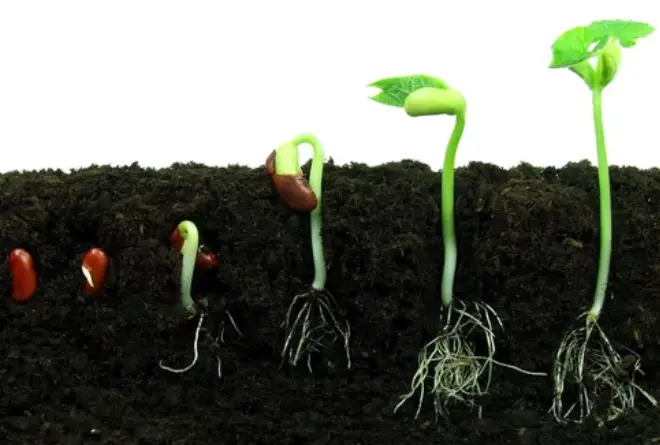Bean germination refers to the process by which a bean seed begins to sprout and grow into a new plant.
This process begins with the absorption of water by the seed, followed by the breaking down of stored nutrients within the seed and the emergence of the radicle, the embryonic root of the plant.
Understanding the time it takes for a bean seed to germinate is important for several reasons.
For gardeners and farmers, knowing the germination time of different bean varieties can help them plan their planting and harvest schedules.
For researchers, understanding the factors that affect bean germination time can provide valuable information for improving crop yields and developing more sustainable growing practices.
This blog post aims to provide an overview of bean germination time, including factors that affect the process, average germination times for common bean varieties, and tips for achieving optimal germination conditions.
Whether you’re a seasoned gardener or just starting, this post will provide valuable information to help you grow healthy and productive bean plants.
Factors affecting Bean Germination Time

These are some of the factors that affect all germination times:
Soil Temperature
Soil temperature is a critical factor in determining bean germination time. Ideal soil temperatures for bean germination range from 60–85°F (15–29°C), with optimal temperatures varying depending on the variety of beans being grown. Too high or low of a soil temperature can slow down or halt germination altogether.
Soil Moisture
Proper soil moisture is crucial for successful bean germination. Too much water can cause the seed to rot before it germinates, while too little water can prevent the seed from absorbing enough moisture to initiate germination. Optimal soil moisture for bean germination is achieved by keeping the soil consistently moist but not waterlogged.
Soil Quality
The quality of the soil in which beans are planted can also affect germination time. Well-drained soil that is rich in organic matter and has a pH between 6.0 and 7.0 is ideal for bean germination. Poor soil quality, such as soil that is compacted or lacks nutrients, can slow down or prevent germination.
Light Availability
Light availability can also have an impact on bean germination time. Most bean seeds require light to germinate, but some varieties, such as lima beans, will germinate in the absence of light. Too much light, especially direct sunlight, can cause the soil to dry out too quickly and prevent successful germination.
Bean Germination Time for Common Varieties

Bean Germination Time
Lima Beans
Lima beans typically have a germination time of 7–10 days, with optimal germination conditions being soil temperatures between 70 and 85°F (21 and 29°C) and soil that is consistently moist.
Navy Beans
Navy beans have a germination time of 7–14 days, with optimal conditions being soil temperatures between 60 and 70°F (15 and 21°C) and soil that is consistently moist.
Kidney Beans
Kidney beans have a germination time of 7–14 days, with optimal conditions being soil temperatures between 60 and 85°F (15 and 29°C) and soil that is consistently moist.
Black Beans
Black beans have a germination time of 7–10 days, with optimal conditions being soil temperatures between 60 and 85°F (15 and 29°C) and soil that is consistently moist.
Note: These are average germination times and may vary slightly depending on local growing conditions and the specific variety of beans being grown. It is also important to remember that germination time can be affected by several factors, including soil temperature, soil moisture, soil quality, and light availability.
Tips for Optimal Germination Conditions

Here are some critical tips needed to successfully germinate your bean seed in the garden:
Proper Soil Preparation
To ensure optimal germination conditions, it is important to prepare the soil properly. This includes removing weeds and any debris, adding compost or other organic matter to improve soil quality, and loosening the soil to allow for good root development.
Proper Seed Storage
Proper seed storage can also affect germination time. Seeds should be stored in a cool, dry place, away from direct sunlight and moisture. It is also important to check the seed packet for the recommended storage time and to discard any seeds that are past their expiration date.
Proper Sowing Depth
The depth at which seeds are sown can also affect germination time. Most bean seeds should be sown to a depth of 1-2 inches (2.5–5 cm), although the specific depth will depend on the variety of beans being grown.
Proper Watering
Proper watering is crucial for successful bean germination. Seeds should be watered regularly, keeping the soil consistently moist but not waterlogged. Overwatering or allowing the soil to dry out completely can prevent successful germination.
Related Post: high quality bean bags
Conclusion
Overall, bean germination is a critical stage in the growth and development of a new plant. Understanding the factors that affect bean germination time, including soil temperature, soil moisture, soil quality, and light availability, is key to achieving successful germination and growing healthy bean plants.
The average germination time for common bean varieties can vary, but with proper preparation and care, optimal germination conditions can be achieved. By following the tips outlined in this blog post, you can ensure that your bean seeds will germinate quickly and successfully, setting the stage for a productive and healthy bean plant.
Whether you’re a seasoned gardener or just starting out, understanding bean germination time is an important step in growing successful and abundant bean crops.
References
- Planting, Growing, and Harvesting Beans. https://www.almanac.com/plant/beans
- Soil temperature and germination. https://www.extension.purdue.edu/extmedia/AY/AY-33-W.pdf
- Soil Moisture in Germination” by High Mowing Organic Seeds. https://www.highmowingseeds.com/blog/the-importance-of-soil-moisture-in-germination/
Note: The above references were accessed on 2023-02-04, and the information may have changed since then.




